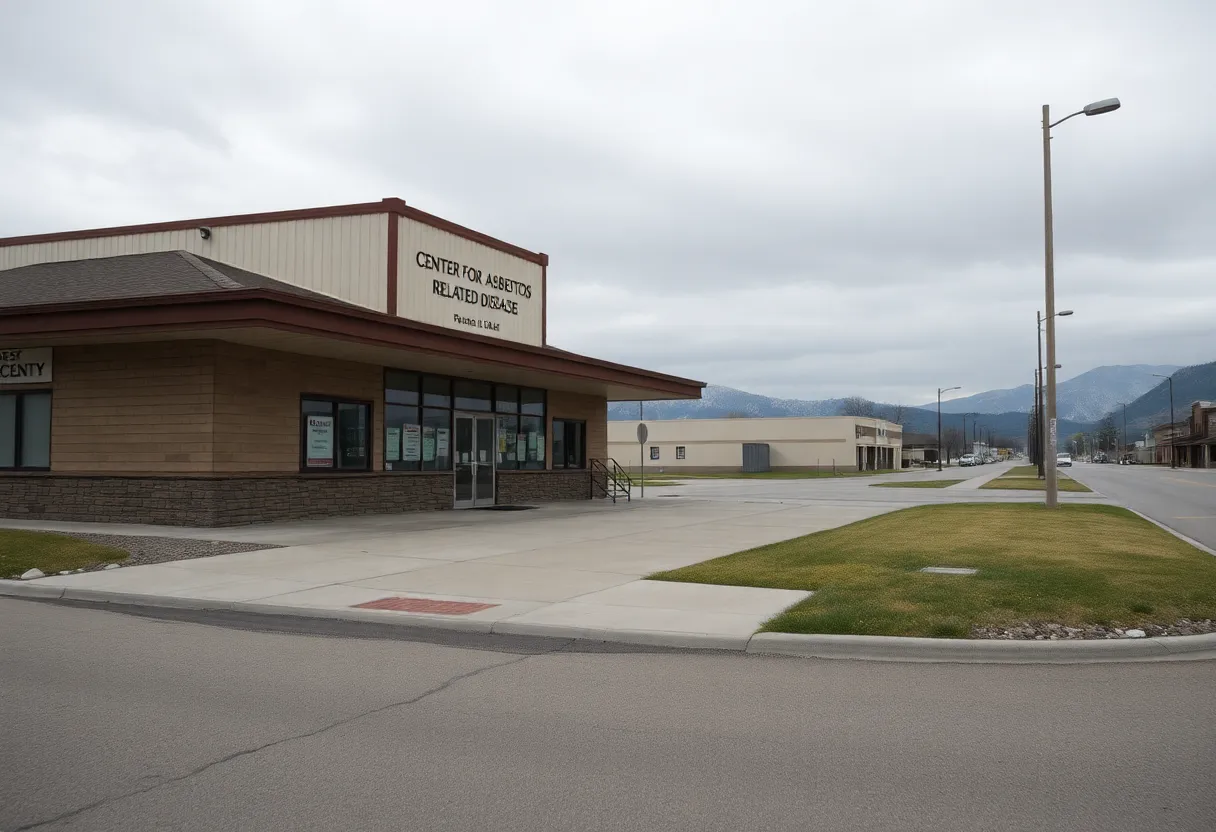News Summary
The closure of the Center for Asbestos Related Disease in Libby, Montana, marks a severe blow to a community suffering from asbestos exposure.
Tragedy Strikes Libby as Asbestos Screening Clinic Shuts Down
In a shocking turn of events, the Center for Asbestos Related Disease (CARD), a crucial health facility in Libby, Montana, has been forcibly closed by the Lincoln County Sheriff’s Office. This closure, which took place on Wednesday, marks a devastating setback for a community still grappling with the damaging legacy of asbestos exposure. Located approximately 50 miles from the U.S.-Canada border, Libby is a small town of about 3,000 residents that has been severely impacted by asbestos contamination linked to decades of mining activity.
Legal Battles and Health Implications
The reason behind the abrupt shuttering of CARD relates to a court order stemming from a lawsuit filed by BNSF Railway. The railway company claimed that CARD fraudulently registered patients as eligible for government benefits, leading to a significant court judgment against the clinic. Following persistent legal challenges, a court ruled that out of more than 2,000 challenged diagnoses, 337 were found to be false. This determination culminated in a staggering $6 million judgment against the clinic, leaving BNSF entitled to a share of that amount. Currently, BNSF seeks to collect $3.1 million in damages, including attorney fees, court costs, and interest.
Impact on Public Health
The closure of CARD is poised to inflict severe consequences on public health in the Libby area. Tracy McNew, the clinic’s executive director, has expressed grave concerns that the inability to conduct screenings for asbestos-related illnesses will exacerbate existing health crises. For over 20 years, CARD has provided essential health screenings, monitoring, and treatment for individuals affected by exposure to toxic dust from the nearby vermiculite mine, which produced asbestos until its closure in 1990.
Moreover, the mine has a notorious history that stretches back to 1881, when gold miners initially discovered vermiculite. Its transformation into a mining operation by the Zonolite Company in the 1920s marked the beginning of years of asbestos production and resultant contamination, with the Environmental Protection Agency (EPA) placing the area on its National Priorities List for the Superfund program in 2002.
A Grave Public Health Crisis
The environmental fallout from the mine has left many residents facing serious health threats, as fibers from asbestos can embed in lung tissue, leading to severe illnesses like asbestosis and mesothelioma. Although the exact number of deaths caused by asbestos-related diseases in the region remains largely unknown, a 2024 federal jury explicitly recognized BNSF’s role in this catastrophe, attributing the deaths of two former Libby residents, who lived near the railyard, largely to the contamination.
Clinic’s Financial Struggles
Following the fraud judgment, CARD declared bankruptcy and managed to continue its operations under a bankruptcy settlement that included arrangements with the federal government and BNSF. Nevertheless, additional local lawsuits have emerged against the clinic, alleging medical malpractice and wrongful death in the context of improper prescriptions tied to asbestos diagnoses. The legal and financial turmoil has forced CARD to close its doors, putting an end to its critical services in a community that has been reliant on it.
Hope for Reopening
With the clinic’s staff of around 19 employees laid off, the future remains uncertain. Nonetheless, McNew has expressed determination to fight for the clinic’s reopening, asserting the necessity of the services it provides. The struggle to reclaim this vital facility speaks to the larger fight against the devastating effects of asbestos exposure that continues to plague the residents of Libby.
As the legal battles play out and the community sheds light on these significant injustices, the fallout from the closure of CARD serves as a chilling reminder of the ongoing health crisis stemming from decades of environmental negligence.
Deeper Dive: News & Info About This Topic
HERE Resources
Asbestos and Lead Paint Concerns Emerge at Local Park and Schools
Florida Jury Awards $18 Million for Asbestos Exposure
Asbestos Crisis Deepens as CARD Clinic in Libby Shuts Down
The Palliser Regional Library Faces Asbestos Challenge: Major Upgrades Required
Slowing Down the Bulldozers: Asbestos Threat Halts Coca-Cola Plant Demolition
After Decades, Asbestos Still Takes its Toll on Mississippi Veterans
Janet Davies Urges Former Workers to Share Asbestos Information
Heroic Marathon Effort Raises Funds for Mesothelioma UK
Hazardous Asbestos-Laced Materials Found in Supermarket Car Park
Johnny Ball: Celebrating a Life of Creativity and Community
Additional Resources
- KPAX: Libby Asbestos Clinic Shuttered After Court Order
- Wikipedia: Asbestos
- Daily Inter Lake: Libby’s Asbestos Clinic Shuttered After Losing Lawsuit to BNSF Railway
- Google Search: Asbestos Health Effects
- The Western News: Libby’s CARD Clinic Closed Following Court Ruling
- Google Scholar: Asbestosis
- AP News: Libby Montana Asbestos Clinic Shuttered
- Encyclopedia Britannica: Mesothelioma



















